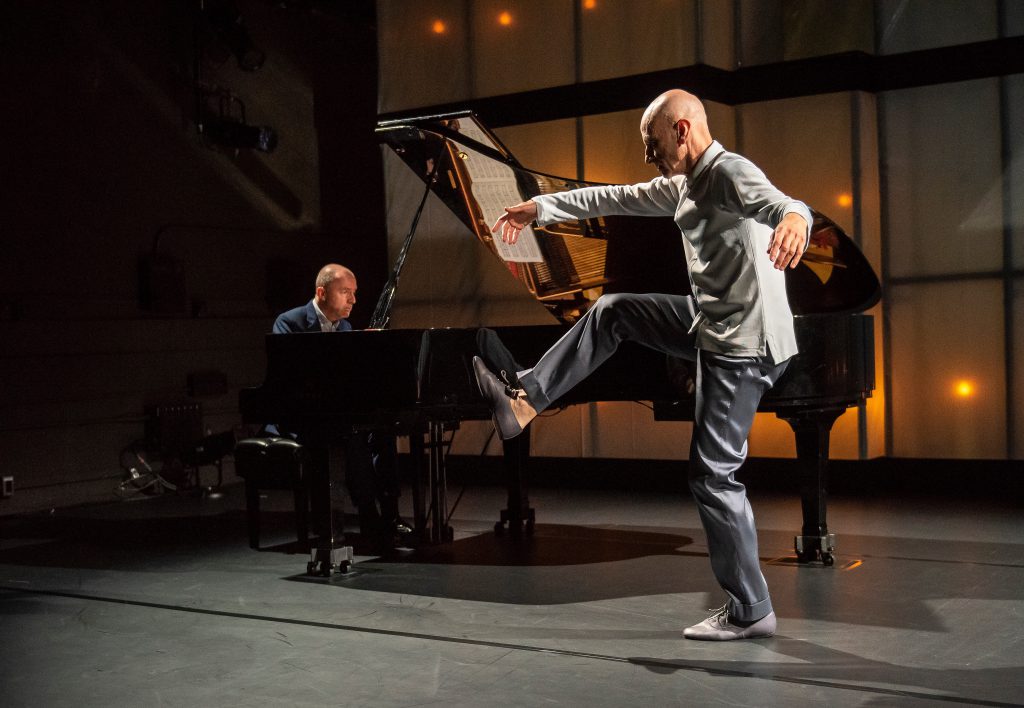Feldman’s music drops out of frame in dance collaboration

Pianist Pedja Muzijevic performed Morton Feldman’s “Triadic Memories” with dancer Cesc GelaBert at Lincoln Center’s White Light Festival Thursday night. Photo: Stephanie Berger
Music and dance have been inseparable since their mutual origin. The classical repertoire is of course packed with music for dance, from courtly celebrations to ballet. But outside of Stravinsky and some John Cage, one finds far fewer pieces in the modernist movement made specifically for dance.
Thursday night at the Baryshnikov Center, pianist Pedja Murijevic and dancer/choreographer Cesc GelaBert attempted to bring dance together with some of the most abstract of modern material, Morton Feldman’s solo piano piece, Triadic Memories.
The performance, presented by Lincoln Center’s White Light Festival, was titled “Framing Time.” That’s a cogent way to look at music in general and music and dance together in particular since music articulates time and dance articulates space in time.
As unlikely as Feldman may seem as a choreographic partner, the music from his last period, like Triadic Memories, has one ideal feature; it’s all about rhythm. Feldman used a minimum of material—no melodies and no functional harmonies—to build long duration compositions out of shifting rhythms. The alternation between two measures of the order of an eighth-note and a dotted eighth means everything in Feldman’s music because it is everything.
Triadic Memories as music for dance makes sense, but, frustratingly, this world premiere dance performance mostly erased the essential nature of Feldman’s music.
In the program notes, Murijevic wrote that he has come to Feldman only of late, joking that his short attention span kept him away. The pianist’s interest is clearly sincere, but that attention span may be hindering his approach.
The performance took 60 minutes, a full third faster than the most common duration for Triadic Memories. While this may have fulfilled a choreographic need, it had a deleterious effect on the music. Murijevic’s pace made it impossible to meaningfully articulate most of the rhythmic variations and modulations, its raison d’etre.
Feldman makes his ideas plain in the first two measures, and Thursday night the lack of rhythmic differentiation between those two measures foretold what was to come. Along with being too fast, the music was much louder than the indicated ppp. Feldman’s marvelous achievement—enormous variety, mystery, and rhythmic tension within a static frame—was wholly lost.
Gelabert’s approach, conversely, was unexpected, interesting, and often lovely. While he at times closely paired with the music, in the main he was a graceful, lyrical presence floating on top of the piece, a melody in movement. He was in sympathy with Feldman in that he used a limited amount of material, which he constantly rearranged and reordered, and the simplest ideas had the greatest impact—a long sequence in which he glided backwards around the piano and the stage was quite beautiful in the way he, like Feldman, defied the forward movement of time.
And that could be taken as the point of “Framing Time,” and a satisfying one. Except not only did the performance begin and end with Murijevic playing solo, but it was Triadic Memories itself that was presented as a frame that contained the dance. And without a performance honest and true to the music, “Framing Time” could not succeed as intended.
“Framing Time” is performed again at the Baryshnikov Center 8 p.m. Friday. WhiteLightFestival.org